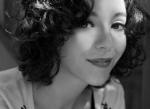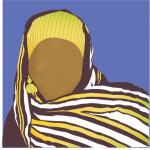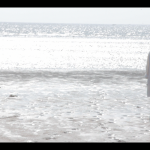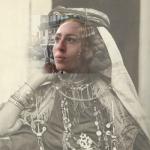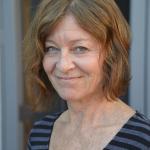Poet Leigh Cuen remembers an unexpected encounter between a Jewish teenager and Muslim grandmothers in Nablus. This memoir excerpt breaks stereotypes wide open with an innocent smile.
When we arrived in Nablus, Emma told me we didn’t have a place to sleep, or a way to get around, or a map. I blinked at her for a moment, eyes watering from the brilliant sunshine. That particular summer, 2009, was unforgivably hot.
“I’m confused.” I told her slowly. “You said you had a friend that would put us up for the night.” Emma had a Muslim Arab boyfriend in Jerusalem, so this claim seemed reasonable.
“I meant to say my friend came here,” Emma replied with a smile. “She said we should do it too.”
“But that’s…really different.” I swallowed. Dry, salty dust frosted my lips.“Where do we go now?” I asked.
She shrugged as if I’d made a petulant comment about the weather. “Don’t worry. Let’s look for a cab.” Emma patted my shoulder.
Just weeks before we arrived, the residents of Nablus had made the world’s biggest kanafeh, a special kind of cheese pastry. They say it weighed 1,350 kilograms, that there was enough gooey cheese, caramelized sugar, and rosewater to feed over 6,000 people.
While munching on a piece of the enormous, warm dessert, one local man told a foreign reporter, “We hospitalized visitors [Note: he meant "are hospitable to visitors"] with this kanafeh. We hope the economic situation will improve."
Nablus was once called the economic heart of Palestine. But that was years ago, before the Second Intifada. I didn’t know anything about Nablus before I visited, except that it had good kanafeh and an ancient bathhouse. Kanafeh was my regular order at the little place in the Muslim Quarter of Jerusalem, near my apartment in the Jewish Quarter. When I traveled to Ramallah for volunteer work for a Palestinian news channel, one man told me, “Nothing can compare to eating kanafeh made with fresh Nabulsi cheese, the ultimate Palestinian delight, in Nablus, the dish’s ancient birthplace.”
The ensuing journey to Nablus was my first recreational visit to the West Bank. I could not hide behind my intern press badge this time to avoid questions about my origins. So I went with an atheist European vagabond named Emma, a friend of a friend.
I knew something was off when we met earlier that morning by the Damascus Gate in Jerusalem. Emma wore a t-shirt and khaki cut-offs. Her socks were extremely short.
“Are you sure you don’t want to head back and change? We can be late.” I said. Even as a fidgety teenager from California, only here a few weeks, I knew dressing this way in the West Bank was an unnecessary risk. I could see the swoop of Emma’s neck and where it curved into the rest of her body.
I left for Palestine wearing an ankle-length dress, tennis shoes with long thick socks, and a long-sleeved blouse. Even the intricacies of my collarbone were left to the imagination. I pulled my hair back in a stringent bun and packed a scarf. I planned to approach a stranger along the way, a Palestinian Muslim my age with an open countenance. I would smile shyly, asking her to please help me tie my hijab.
The only compensations I had to offer were flattery in broken Arabic and promises of the candy in my backpack. My curious habit of winking to punctuate questions sometimes helped me befriend strangers.
In my previous trips to Bethlehem (also for work), I found this to be the best method of covering my red hair, which drew burning eyes like a pair of exposed breasts. Scarves constantly slipped off of my head and dragged along the ground until I asked a stranger for help. To my pleasant surprise, strangers were usually happy to help me. They wrapped me tight.
“You cute in hijab, looks good.”
Old women on the street would smile at me with their soft, toothless grins. “Jameeyla,” (Beautiful), they whispered. Jameeyla was the first Arabic word I learned.
“Have you ever been to the West Bank?” I asked Emma as we walked away from the stone gate, towards the Muslim Quarter.
“No, it’s fine. They know I’m a tourist no matter how I dress,” Emma shrugged. “At least this way I’m comfortable.”
When we walked together, from one bus to another in the bustling urban heart of Ramallah, on our way to Nablus, I kept my eyes on the ground and spoke only in whispers. But nothing could stop the staring. Men, small children and their mothers gawked at Emma and I. They sat diagonally on their bus seats just to get a better view.
I sat quietly with my hands in my lap, my gaze locked on the horizon. In the reflection of the window, I saw their fixated eyes, quizzical. My presence confused them. For the first time in my life, I felt grateful for my generic, undecipherable name, a Mexican and Gaelic scrabble of words, not obviously associated with any ethnicity. On paper, I am ambiguous and androgynous. Not even Emma knew that I my mother was a Zionist and my boyfriend an IDF combat soldier.
Palestinian men frequently called out to us. Emma made snide remarks under her breath. “Yea, we know we’re sexy.” She snickered. I giggled. It was euphoric to suddenly have a companion, after months of traveling alone in the Holy Land, to share the constant humiliation and alienation of “otherness” with someone, even this strange acquaintance.
The journey was long and bumpy. The landscape was breathtaking.We careened through valleys. Deeper and deeper into the West Bank, until almost no traces of Israeli military presence where left except for a few unmanned, vacant check points, empty markers of past heat like stray graves along a highway.
We soared through hills laden with olive trees. I nodded off for a minute, had sweaty, vibrant dreams. When I opened my eyes, I saw Nablus. All around the city were pairs and clusters of burly, Palestinian men wearing green military uniforms. They all carried black Rambo-sized weapons. Emma hailed us a cab.
The day was still cloudless and sweltering when our taxi stopped in front of a Palestinian school. I looked at Emma. She nodded, as if this might be the place she heard cost only $12 a night. Neither of us understood the word we were given for directions. But the cab driver gestured vigorously.
Emma and I crossed the schoolyard; a flock of giggling children followed us like a shadow. The compound itself was angular, exposed concrete save for a low wall surrounding the area, which had vibrant paintings of stick figures holding hands beneath a Palestinian flag and doves totting olive branches. We followed nods and gestures to a back room. The floor was littered with colorful plastic toys, the walls with pictures of cartoons and simple arithmetic. A Palestinian man with prominent jowls and an untamed moustache offered us each a shot glass of steaming, black coffee. He sat across from us.
“This your first time in Nablus?” He asked Emma. We both nodded in agreement.
“My friend said that you would help us find somewhere to stay for very cheap. The school perhaps?” I looked at Emma, eyes bulging.
“No, no. This won’t do,” he cried. The man waved his arms back and forth, punctuating his sentences with his whole body. “You will stay at my house and eat with my family.” He insisted, pressing his palm over his heart. Now I understood. This was all performance. The local culture of hospitality demanded that this man open his home to us. I wanted to throttle Emma.
I was such a sucker. I had honestly thought we would stay with a friend of her boyfriend’s. Maybe a cousin, even a girl our age. That is one of my greatest flaws. I trust too quickly. But I couldn’t even pronounce the address of the school we sat in. I knew I couldn’t abandon the quasi-translator beside me, despite her apparent lunacy. I became sharply aware, as if ice touched my bare skin, that I was a white, Jewish teenage girl. And without Emma I would be alone in Nablus.
“You want go to bathhouse?” He asked.
“Yes, the bathhouse, some shopping, and get some Arab cheese dessert. She loves it.” Emma gestured towards me. They suddenly remembered I was in the room.
I forced an apologetic smile. Now we are expecting him to be our chauffeur? Great, Emma. Just great. Way not to look like the spoiled, self-entitled tourist.
The schoolmaster called out in Arabic. A beautiful Muslim woman with a generous mouth entered the room. I didn’t need a translator for their conversation. I watched the sudden, disappointed slouch of her posture, the way that she sighed, putting her hands on her hips.
“Take these girls to the bathhouse and make sure that they don’t get themselves into trouble.” He probably said. She huffed. She looked at him pleadingly. She said some Arabic variation on: “Do I have to?” She sighed, looking at us. The round-lipped woman smiled at me with tangible venom.
“She take you to bathhouse and then take you my house.” He told us. We nodded.
Then he rushed from the room, eyes glazed with distraction. “Come,” she commanded, nodding back the way we came. I followed reluctantly, eyes still clinging to the corners of the room as we left.
Two Palestinian men also traveled with us. They all seemed equally bored by Emma and I. We walked through the maze of the city to Nablus’s commercial center. The air teemed with all the smells of a shuk: spices, fresh pita, raw meat, herbs, pastries and men that love designer colognes too much. I pulled out my purple silk scarf and asked our tour guide to tie a hijab for me. Within seconds my head was wrapped in cascading fabric.
We stepped outside onto the street. My eyes darted from the donkey-powered wooden cart full of pastries, to the shop windows bedazzled with posters of a Lebanese pop star in a clingy silver dress and thick makeup. My gaze wandered through the gaggles of people swirling around me, all draped in long robes. They shouted, laughed and haggled.
When we finally arrived at the stone dome structure, we left our guards behind. From outside the building looked disappointingly small and grey. The bathhouse was gender-segregated according to the day. There would be no men allowed past the threshold today. Inside the air was swampy, heavy. A profusely sweating Palestinian woman led us into a back room carved entirely from smooth stone. The tour guide told us to strip naked.
“Excuse me?” I gagged on the question. I looked to my right and my left. middle-aged Palestinian women were removing all of their clothing without reservation. Most left their panties on, but nothing else. A few women kept their bras on. I turned to Emma. She was already down to her underwear. I stripped, blushing that all these women could now clearly see my cartoon-print panties with happy fruit on them.
They handed Emma and I stiff towels. Then the glistening woman led us to a cavernous round room, the size of a basketball court, carpeted with colorful tiles. A sculpted water fountain gushed in the room’s center. A handful of women lay strewn about the room in various stages of dress. Some reclined on the tile steps; others sat on the raised shelf around the edges of the room, smoking nargila, gossiping and sipping hot coffee or tea.
The Palestinian women hardly noticed the two naked tourists walking through. Most of these women were older, their skin spilling out in generous folds. A particularly beautiful young woman, with elbow length black curls, sat in the corner. She was veiled in a haze of sweet flavored smoke.
The beautiful woman with round lips stood up and asked me: “Do you want coffee or coke?”
I stared for a moment with my head tilted on its axis. “Whoa, I didn’t recognize you!” I gasped, as if that wasn’t obvious from my awkwardly long pause. “When women around, it’s okay.” Our reluctant guide said, petting her luscious curls and tight green t-shirt. Her smile softened like butter. “But with men outside my family, no.” She wagged her finger.
Then she said something about her fiancé, which I didn’t understand. Her English words were slathered in Arabic sounds, dramatic and musical. I was handed off, along with Emma, to the bathhouse woman drenched in sweat. We followed her away from the fountain and into a spacious chamber, clouded with steam. She dripped onto the moist tiles. The chamber looked like a ballroom carved from a single piece of polished marble.
There were faucets and shower spigots above rows of marble seats around the ridges of the walls. I moved to wipe the sweat from my forehead; but the back of my hand was already slick with moisture. The bathhouse woman in the red dress smiled at me. Evidently this was the desired effect. “Sleep here,” she pointed towards the floor. “She come rub you later.” The bathhouse woman felt no need to clarify who “she” was. But her services sounded promising. I lied on my back across from Emma. Sunlight shimmered in colorful circles of stained glass scattered in the stone roof like round, glowing stars. We stared up at the light dancing across the ceiling.
I smiled and spent a few moments just breathing, maybe for the first time since I’d landed on this side of the world. The marble beneath me radiated wet warmth.
Around an hour later, Arabic dance music echoed off of the curved walls. I scanned the chamber with my eyes, but couldn’t find any speakers or source for the music. Steam fogged my vision. I blinked. I remembered the newspaper article I read about the bathhouse undergoing restorations and being named a Palestinian heritage site. That article, and the city’s reputation as the birthplace of kanafeh, had inspired me to follow Emma to Nablus.
I didn’t know how there was suddenly dance music pulsing through the ancient building, in the fountain room and steaming chamber. But I was glad. This is my JAM. I wandered through the marble room and shook my hips with my arms in the air, too relaxed to be self-conscious. A naked Palestinian grandmother laughed, clapping her hands along to help me keep the rhythm.
Another woman, with sunbursts of grey streaking her auburn hair, stood up. She danced beside me, jiggling in places I didn’t know that a body could jiggle. She controlled the crisp sways of her hips with effortless precision.
A third elderly woman joined us, waddling along to the beat. I laughed and shimmied over to a faucet with warm, running water. I shimmied with them while I rinsed. Then I sprinted down the hall, barefoot and wild.
I found a whole congregation of bathed and soon to be bathed women, gyrating in the fountain room, hands high in the air. The women encouraged me, demonstrating simple hips movements.
Up. Down. Tilt. Drop. Side. Swish. Hold. Other side. Twirl your wrists. Anchor yourself in your feet, sprout roots. They smiled graciously when I mimicked them. The hall echoed with shrill ululations.
The dancing simmered down after a few songs. People returned to smoking sweet flavors and gossiping. Emma didn’t emerge until there was only me left, alone by the fountain, swinging my hips exuberantly with wet hair tumbling down over my breasts.
- Log in to post comments
